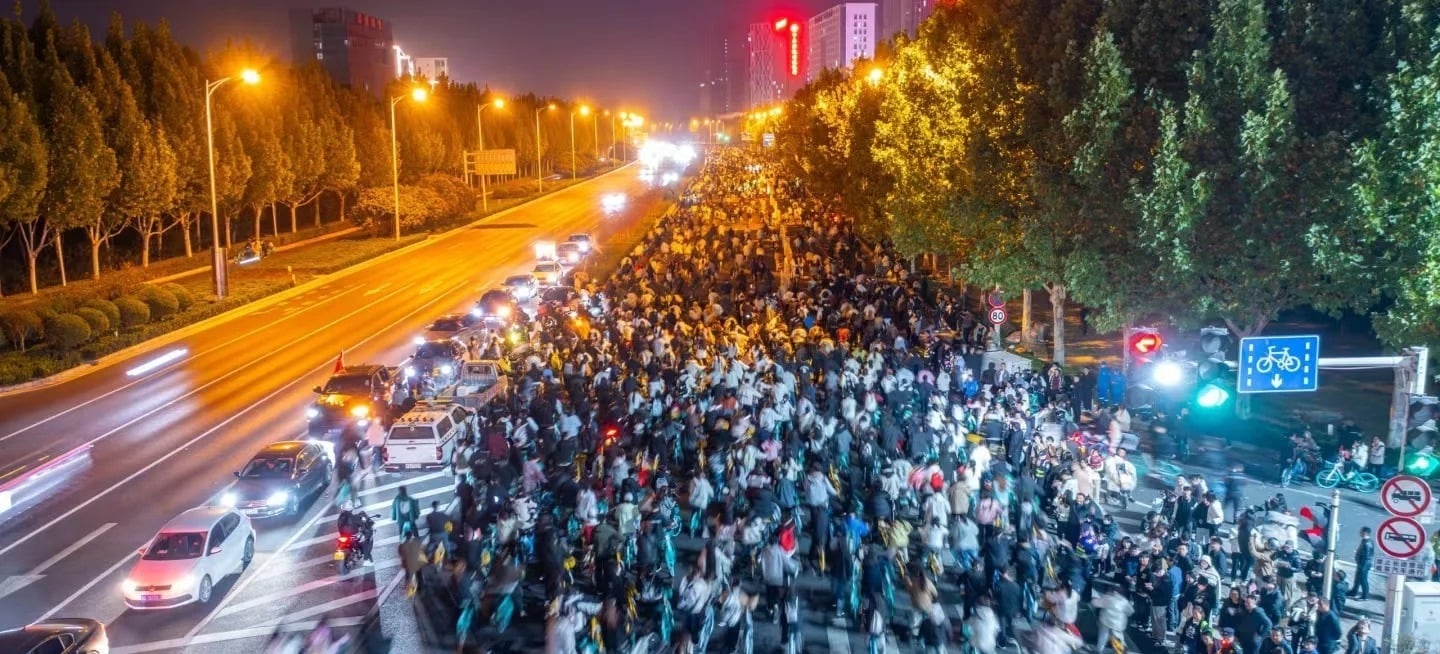Last weekend, the phenomenon of Chinese college students biking nearly 50 kilometers between two relatively obscure cities unexpectedly attracted international attention. Students in Zhengzhou, the capital of Henan province in central China, have been gathering together in the middle of the night to ride shared bicycles eastward along Zhengkai Avenue to the ancient city of Kaifeng and eat guàn tāng bāo (灌汤包), a local variety of soup dumplings. What began as a spontaneous adventure for four college students turned into a full-blown trend, with the night of November 8 witnessing a massive crowd of cyclists hitting the road. The sight of Zhengkai Avenue transformed into a sea of riders turned the trend into a media spectacle, and sparked debate across China.
In fact, at first the nocturnal bike rides received a uniformly positive response, even from state media. Articles in outlets like People’s Daily Online framed the rides as “a symbol of youthful energy and the joy of shared experiences.” The rides were celebrated with the hashtag “The Night Ride to Kaifeng: Youth is priceless, enjoy it in time,” which received positive coverage from China’s state broadcaster, China Media Group.
The trend was enabled by the convenience and popularity of bike-sharing systems in China. With bikes accessible at virtually every street corner, cities across the country are equipped for effortless, affordable mobility. Platforms like Meituan, Hellobike, and Ofo have pioneered the shared economy in transportation, making it easy for users to pick up and drop off bicycles at their convenience. While biking between cities on shared bikes is somewhat unusual, it speaks to the popularity of this affordable transportation tool amongst young people, as well as the growing trend towards more physically active, adventurous forms of tourism.
However, after the number of night riders reportedly reached a hundred thousand on November 8, authorities began to grow more concerned about the night ride’s potential safety implications. As the young cyclists filled up Zhengkai Avenue’s multiple lanes, there were fears that they could cause traffic accidents or prevent emergency responders from reaching others in need of assistance. On Saturday November 9, the provincial police announced that the road would be closed to non-motorized vehicles until noon on Sunday.
In light of the restrictions, it remains to be seen whether the bike riders will return for dumplings next weekend. Overall, last week’s events speak to the difficulties China faces encouraging tourism to some of its less developed and less well-known areas (as exemplified by the brief craze for Zibo barbecue last year) and fostering a wholesome youth culture — the rapid rise of a certain destination or activity can make it the victim of its own success.
Banner image via 吃素还真能瘦 on Xiaohongshu.







![Feature image of In Hangzhou, This Field is Where 20,000 Confiscated Bikes Have Gone to Die [UPDATE: Now with Video]](https://imagedelivery.net/WLUarKbmUXuuhDC7PG5_Qw/articles/fc3a683fddd8bcef67c98e5d04e2912c.jpg/public)










